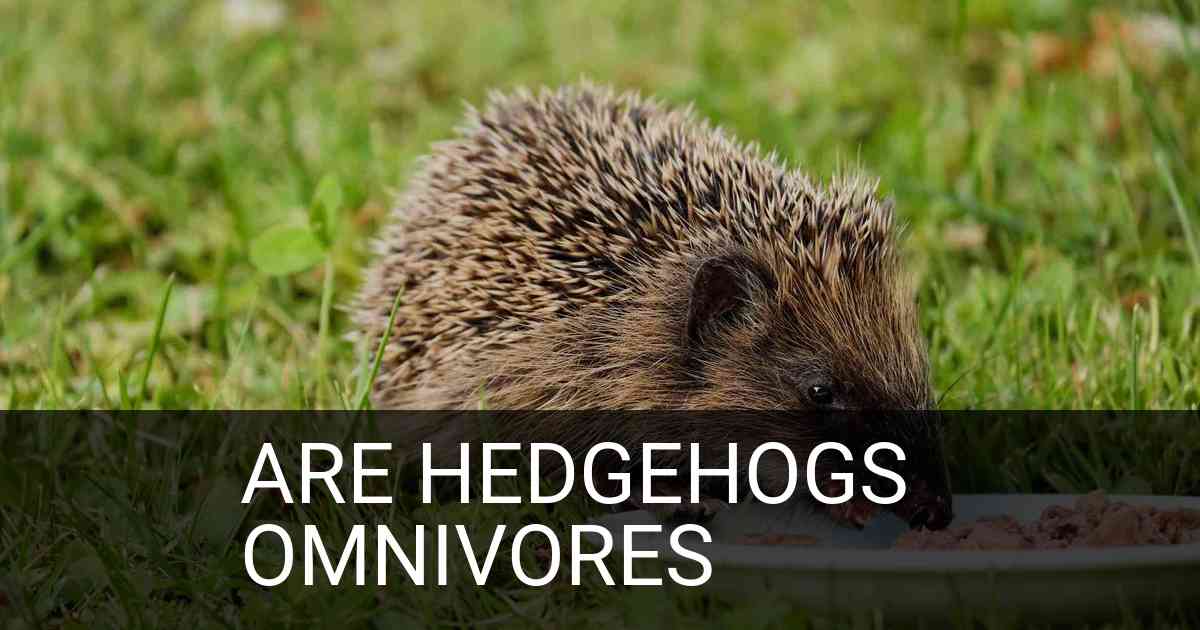
Hedgehogs have been a beloved pet for many people throughout the years, but what do we really know about their diet? Are hedgehogs omnivores or do they follow a strictly herbivorous diet? To address this question, this article will provide an in-depth look into the dietary habits of these small creatures. We will explore the different types of food that hedgehogs eat and discuss if they are truly omnivores or not. Finally, we will examine how to properly feed your pet hedgehog so that it can stay healthy and happy.
Are Hedgehogs Omnivores?
Hedgehogs are not strictly herbivorous animals and in fact, they have a varied diet that includes both plant-based and animal-based foods. While their primary diet consists of insects such as beetles, caterpillars, and grubs, they will also consume other small creatures like worms and snails. Additionally, hedgehogs enjoy fruits and vegetables such as apples, bananas, carrots, lettuce, melons, pumpkins, and squash.
Besides these food sources from the animal kingdom or plants kingdom, hedgehog owners can provide cat/dog dry food to their pet as well. This type of commercial food is usually enriched with vitamins and minerals which helps hedgehog’s overall nutrition.
Therefore, it is safe to conclude that hedgehogs are omnivores since they consume both plant-based and animal-based foods for sustenance.
The Dietary Habits of the Hedgehog
Hedgehogs are omnivores, meaning that they eat both plants and animals. They feed mainly on insects, worms, slugs, snails and other small invertebrates as well as some fruits and vegetables. They also occasionally supplement their diet with eggs or carrion.
Insects
Insects are a major part of the hedgehog’s diet. This includes beetles, grubs, caterpillars and earthworms. These provide essential proteins that help keep them active during their nocturnal activities.
Fruits & Vegetables
Though not a major source of nutrition for hedgehogs, they will sometimes consume small amounts of fruit such as apples and melons when available. They also may nibble on some vegetables like carrots or sweet potatoes.
Eggs & Carrion
Due to their omnivorous nature, hedgehogs can sometimes be seen eating eggs or carrion from smaller animals if it is readily available in the area. This helps to supplement their main dietary sources.
Additional Foods
Hedgehog owners may also choose to feed their pets additional food items such as mealworms or crickets for extra protein. Some people even give them canned cat food which contains essential vitamins and minerals.
The Carnivorous Diet of Hedgehogs
Hedgehogs are small, spiny mammals that are native to Europe, Africa and parts of Asia. They have a diverse range of diets that depend on the species. Some hedgehog species are mainly insectivores while others feed mainly on fruits, seeds, and vegetation. The most common type of diet for hedgehogs is carnivorous.
A carnivorous hedgehog diet consists primarily of insects and other invertebrates such as worms, slugs, snails, beetles, millipedes and centipedes. They may also eat small animals such as lizards or mice if available. Hedgehogs typically hunt at night when their prey is most active.
In captivity, a variety of commercial dry cat food can be fed to supplement the natural diet with proteins and vitamins needed by the animal. Food should always be supplemented with fresh vegetables like tomatoes or carrots as well as water in order to maintain proper hydration levels.
Nutritional Requirements for a Healthy Carnivorous Diet:
- Protein: A high-quality protein source should make up about 50% of your pet’s dietary needs each day.
- Fat: A moderate amount (about 20%) fat will provide energy and help keep their coat healthy.
- Carbohydrates: This should not exceed 10%, preferably from complex sources like whole grains or legumes.
- Vitamins & Minerals: These are essential for maintaining good health so they should be included in every meal you prepare for your pet.
Popular Foods for Hedgehogs
Hedgehogs need a balanced diet to stay healthy and active. The most popular foods for hedgehogs include the following:
- Insects: Mealworms, crickets, cockroaches, wax worms and similar insects are great sources of protein for hedgehogs. They should be offered in moderation.
- Fruits & Vegetables: Fruits such as apples, melons, bananas, strawberries and blueberries provide essential vitamins and minerals. Vegetables like squash, carrots and sweet potatoes also make great additions to a hedgehog’s diet.
- Commercial Diets: Commercial diets formulated specifically for hedgehogs offer an easy way to ensure your pet is getting all the nutrients he needs. These can come in the form of kibble or canned food.
Foods to Avoid Feeding Your Hedgehog
It is important not to feed your hedgehog certain foods that can be harmful or even toxic if consumed in large quantities. Some of these foods include:
- Avocados
- Chocolate
- Dairy Products
- Nuts & Seeds
- Onions & Garlic
Conclusion
Based on the evidence presented, it can be concluded that hedgehogs are true omnivores. They have an appetite for a variety of foods including both plants and animals, which they obtain from their natural habitats. While they will take advantage of any available food source, they tend to prefer insects and other small prey items in their diet. Their dental structure is also well-adapted for consuming both plant and animal matter. Therefore, it is safe to say that hedgehogs are indeed omnivorous animals.

